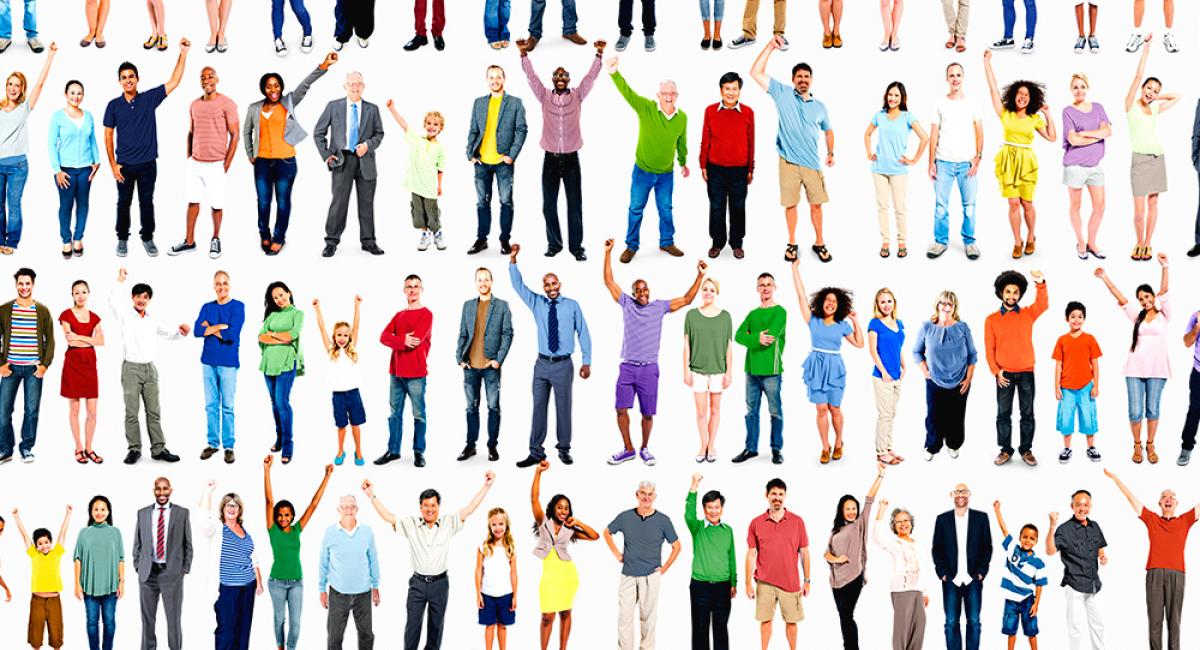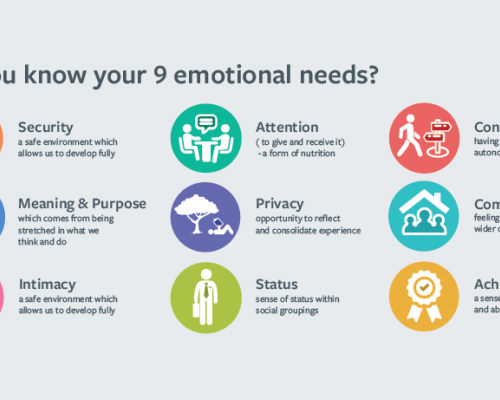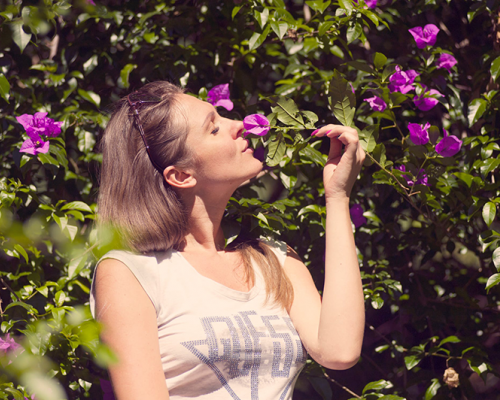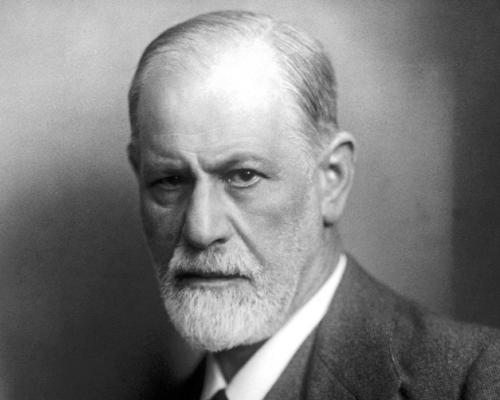Body image and mental health
Julia Welstead looks at why we care so much about body image
Why are we bothered about how we look? Some would say they don’t care, others are obsessed with appearance, many of us are in between. Within the catch-all of ‘body image’ is our physique – shape, size, fitness level – and also how we cover our bodies – clothes, make-up, hair, piercings and tattoos. Apart from the obvious need to wear clothes to keep warm, what’s it all about?
As is so often the case, the answer lies in our innate needs – the nine essential emotional needs without which we cannot thrive as human beings and which, along with our innate resources, form the framework upon which the human givens approach is founded.
The drive to survive
Two of our essential emotional needs involve connection to our fellow humans: to be connected to our wider community, and to have at least one intimate relationship with a person who can accept us “warts and all”. This harks back to a time when we quite literally would not have survived outside a group – a tribe – within which we could share the responsibilities and benefits of staying safe and finding food, where we could thrive and procreate.
We innately need, therefore, to be accepted and to fit in. Studies on facial recognition, and the discovery of mirror neurons in our brains, show that we seek to connect with people who look like us, ergo if we want to join a group we will do things to emulate them. And of course this includes how we look and what we wear as well as how we behave, move, speak and express our beliefs about the world around us.
Think mods and rockers, goths, punks, for extreme examples, and then think of all the more subtle ways we all do this to an extent. We are mimics, and we build rapport through unconsciously matching our behaviours. An infant survival technique is to watch the facial expressions and movements of those around them and do their best to copy them, to learn how to fit in with their tribe as well as to get attention and therefore food, warmth and safety.
It’s clear then, that we are conscious of body image because we need to fit in with a group, and we need to attract a mate with whom we can feel completely relaxed. But how does this affect the state of our mental health? As with all our essential emotional needs, if our need for connection in both the broader context and in the intimate sense (and this need not be a sexual relationship) is not being well met, we will feel an array of emotions: unsettled, out of kilter, anxious, fearful, lonely, depressed.
Having ascertained why body image is important to us, and how it can affect our mental health, it becomes easy to see how important it is for us to feel OK about ourselves, and how awful things can be when we don’t. But this is where social pressures get involved: what does OK look like? And how can we become better than average – because oddly, we want to both fit in with the crowd and stand out from the crowd (be the best within our grouping, shine).
Chasing the balloon
Rest assured, the media has all the answers, and is very happy to tells us, with a constant flow of messages all saying the same thing: buy this (clothing, make-up, miscellaneous item)... to be the perfect you... you deserve it...with it you will be happy, without it you will be sad (you won’t fit in). Models show us the ‘perfect’ physique – female, male and gender neutral – to aim for. Such perfectionism is of course unattainable, and creates a constant need to chase the balloon.
In an unwitting condoning of such commercial pressure we show each other, through social media, how great we are looking, with the right clothes and accessories, shiny hair, white teeth, happy demeanour – and don’t worry if you aren’t looking so hot, you can alter your online looks with an ever widening range of filters and airbrushing techniques: you can fake it.
Online dating sites are increasingly focused on image rather than description, and TV ‘find a partner’ shows have rapidly transformed from the coy “Blind Date” format where participants discussed their hobbies and interests, to the blatant “Naked Attraction” where the initial discussion is on the merits of the penis or vulva on display, before a torso and face is even seen, never mind spoken to or allowed to respond. Shocking? But ‘reality’ TV shows, where the ‘best’ win and the imperfect are shamed and dismissed, are just the latest variation on the theme of gladiators fighting lions – kill or be killed, ridiculed, cast out – that have provided popular entertainment throughout our human history.
"The pressure to conform in order to be accepted into a group can, ironically, cause isolation, loneliness, desperation and even suicide"
No wonder we are feeling a little fragile about our appearance! Even if our physique is absolutely fine, we can develop body dysmorphia (perceiving the natural differences in our body as defects from ‘the norm’). Body image anxieties create a space for symptomatic responses ranging from yo-yo dieting to anorexia, from ‘cover up’ dressing (baggy, dull clothing that hides everything) to self-harming, depression and a level of shame that can prompt avoidance of social situations. The pressure to conform in order to be accepted into a group can, ironically, cause isolation, loneliness, desperation and even suicide.
Body image and mental health is a two way street of course: suffering emotional distress for some other reason such as the death of a much loved partner, or the loss of status when one retires or is made redundant, can have a knock on effect on one’s physical confidence as the need to be accepted in a new light (single in a world of couples, no longer wearing one’s profession as a badge etc) becomes apparent.
There is also an age factor here. We are at our most vulnerable as young teens when it feels vital to be liked and accepted, and body, clothes and accessories are our marketing tools. As we mature most of us realise that what matters sits on the inside, not the external gloss. Marketeers know this, and focus their attentions on the young – piling even more pressure onto an already vulnerable group.
Identity and individualism
I have emphasised social acceptance, but there is also self acceptance, and the contemporary importance given to identity and individualism. This puts tremendous pressure on people to be uniquely themselves, which animates the discussion around gay and trans identity, but is not limited to gender matters. Self-affirmation, rather than fitting in with a socially prescribed ideal, is fabulous if you have the confidence and self-esteem to pull it off. But you have to face the confusion and uncertainty all on your own, and need to be resilient to succeed.
Danish comedian Sophie Hagen points out that fat is not only a feminist issue (aka Susie Orbach 1978) but also a commercial one. The media wants to keep us feeling unhappy about our bodies so that we buy their products. Sophie discusses the importance of wording, and describes herself as fat because this is a neutral word, whereas ‘overweight’ has negative connotations and suggests the need to do something about it.
We can broaden this concept: Skin too pale? Buy a fake tan. Hair too dull? Buy highlights. Tummy a bit flabby? Buy a gym membership. And the images of the resultant success you are buying into invariably involve being part of a group of happy people or being romantically entwined with a beautiful mate - thus tapping into our innate need to belong, to connect. Body image has, of course, become a huge commercial issue.
The lightbulb moment
Realising that the pressure to conform is predominantly commercial was a lightbulb moment for Sophie Hagen – she rejects the current ‘body positive’ bandwagon onto which so many fashion labels are hitching a commercial ride. Their plus size models are still of an acceptable size (not truly fat) and of exceptional beauty. They are still promoting the idea of success and happiness emanating from beauty. Sophie aims for feeling as neutral about her whole body as she does, for instance, about her ears.
Her book “Happy Fat” argues that, “fatphobia is a product of capitalism – designed to keep us consuming diet products and miracle foods, and patriarchy – which demands women exert an impossible level of self-discipline around their looks”. And Sophie sums up the argument with a Naomi Wolf quote that sheds a whole new light on the issue: “A culture fixated on female thinness is fixated on female obedience.”
Now there’s a thought that should send any sane woman running in the opposite direction – if we can. Over the centuries social pressures have included such mutilating atrocities as the Chinese/Japanese crippling of feet by binding them from childhood to make them stay small and ‘beautiful’ and the African/Asian tradition of neck elongation by adding rings as children grew. All in the name of beauty? Or obedience?
But as the Mental Health Foundation emphasise, body image anxiety cuts across age, gender, sexuality and ethnicity, with men increasingly under pressure to have the perfect, toned physique. We must not think that this is all about women. And whilst acknowledging the anxious despair that body image pressures can put on any of us, Mental Health Foundation CEO Mark Rowland looks to the positive with his comment that, “the more comfortable you are with your body, the greater your overall wellbeing, and the less likely you are to engage in destructive behaviours.”
“The more comfortable you are with your body, the greater your overall wellbeing”
Gaining these insights and perspectives into what is really going on in the world of physical norms and expectations can offer a huge source of relief for people suffering the mental distress of body image issues. But knowing this on an intellectual level doesn’t mean we can release ourselves from such pressures and anxieties on an emotional level.
However much time and effort we spent on our physical looks, if we're not getting our innate psychological needs met well and in balance we are highly likely to be unhappy. Looking at life through the holistic human givens lens can illuminate any essential emotional needs that are not being met, and can remind us of the wealth of innate resources we have that can be put to good use to redress that balance and regain a level of emotional wellbeing that is not reliant upon looks.
When our essential emotional needs are being met well we are less vulnerable to marketing and peer pressure – and more able to be ourselves.
Supporting Mental Health Awareness Week #BeBodyKind #MentalHealthAwarenessWeek
© Julia Welstead 2019
You may also like our podcast:
Why self-care isn't selfish >
Latest Tweets:
Tweets by humangivensLatest News:
HG practitioner participates in global congress
HG practitioner Felicity Jaffrey, who lives and works in Egypt, received the extraordinary honour of being invited to speak at Egypt’s hugely prestigious Global Congress on Population, Health and Human Development (PHDC24) in Cairo in October.
SCoPEd - latest update
The six SCoPEd partners have published their latest update on the important work currently underway with regards to the SCoPEd framework implementation, governance and impact assessment.
Date posted: 14/02/2024












